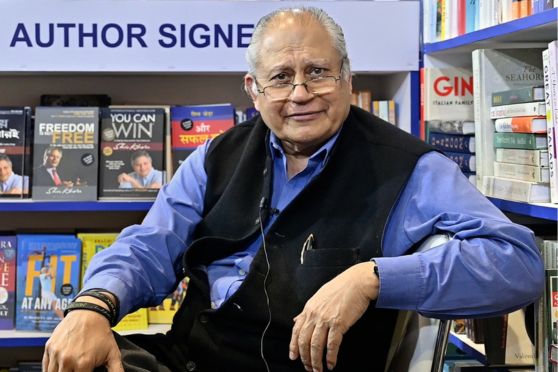Choose a career where you can give more: SHIV KHERA


Freshers go through a lot of pressure when it comes to starting a new job. They are both anxious and eager to do their best work in a new work environment. As a novice, one can reach a stage where they're unsure of how to proceed or might even lose concentration if they have setbacks. It's critical that freshers maintain their motivation so that they don't make hasty judgements regarding employment. To help freshers deal with the anxiety and stress they go through The Telegraph Online Edugraph brings you expert advice from MR. SHIV KHERA, who is a well-known speaker, author, educator, and business consultant. He gives youngsters the inspiration and encouragement to reach their full potential. He has been to far-flung locations, like Singapore and the United States, to deliver his compelling personal messages. Millions have been guided towards personal development and fulfilment by his 40 years of study and comprehension. Read on to know more ..
NJ: What according to you is the biggest lesson from failure? What can a young student learn from it, instead of letting it destroy them?
SK: For a winner, every failure is a stepping stone, and for a loser, it is a stumbling block. You will find all success stories are stories of failure, but they fail forward. Which means they learn from the failure and change course for life. Sadly, many people confuse failing with failure. Some of the greatest masters were the greatest disasters when they started. They learn from their failure and change course to achieve great heights. We have all heard Edison’s story. He was told, “You’ve failed 10,000 times, when will you stop?” His answer was, “I have not failed 10,000 times, I have successfully found 10,000 ways that won’t work”, and eventually he succeeded. This is called failing forward.
NJ: What does good leadership style look like?
SK: Leadership is not about styles, it’s about character and characteristics. Leadership is not about acting but about substance and positive behaviour. It is about sincerity, authenticity, and practising certain principles that are time-tested. They need to have clear vision, immaculate integrity, and the power to communicate with firmness yet in a polite manner. This is what helps a good leader to build a great team. A great leader is the one who creates more leaders. So it’s definitely not about style, it is about substance.
NJ: How can students find unique solutions to their career choice problems?
SK: Problems are a reality for all of us. So long as we are alive, we shall have problems. We cannot solve all our problems, but we can handle them by accepting them. Some people are only problem-focused. They have a problem for every solution. But, if we can change, let’s have the courage to do it, and have the wisdom to know what we can and what we cannot do. This wisdom makes us solution-focused people. Most people keep looking for jobs where they can get more, but very few people think of a job where they can give more, and wherever you can give more is where you can grow more. Choose a career where you can give more.
NJ: What are the most critical changes that a young adult must make to face the future effectively?
SK: The most critical change a person must make is a change in attitude. To face the future effectively, one needs both skill and will. One without the other will not work, but between the two, will is a little bit more important than skill. That’s the major difference between skill and competence. Skill is an ability, while competence is ability along with the willingness to do the job. There are many skillful people who are totally incompetent. Competence is what brings effectiveness.

NJ: What is the best way for a fresher in his/her first job to make a substantial difference?
SK: The best way is to always put in 200% into anything they do. They have to make a commitment to standby and make a success of what they do. They can’t go with a casual attitude that, “I’ll go and try”. Guaranteed it won’t work. Problems are bound to happen. People who are uncommitted, the moment they face the first problem, they quit.
NJ: What is one piece of practical advice you would give to someone starting out in their first job?
SK: Most people take a job and do as little as they can get by with. That’s a recipe for failure. Successful people live by the principle that I shall always give more than what I get to my family, organisation, customer, and company.
NJ: What are some common misconceptions young adults have about the corporate world? How can they combat these misconceptions and communicate more effectively?
SK: Most people live by job hopping, thinking they’ll get a hike at their next job. They are inconsistent and not trustworthy. People, who walk in for a few bucks, also walk out for a few bucks. They are not dependable. Ability without dependability is a liability. They need to change their attitude and develop integrity, instead.
NJ: Below we close - there is one other thing we would like to know. Your speeches are known for the impact they make on your audiences - is there a secret mantra that you can share with us?
SK: A speech in order to be captivating must have a strong opener and a closure. Reason; openers and closers leave impressions and many times contents are lost. That does not mean the contents are not important, but openers create a first impression and you do not get a second chance to make a first impression. Openers last the first 15 seconds, and within the first 15 seconds, the listener becomes attentive or switches off.
In order to make the speech informative, it must have a “WOW!” factor to it. A “WOW!” factor will only come if it has the 2 following elements:
2. They must say “From this point onwards, this is what I’ll do in my life.”
An informative speech must result in positive action.